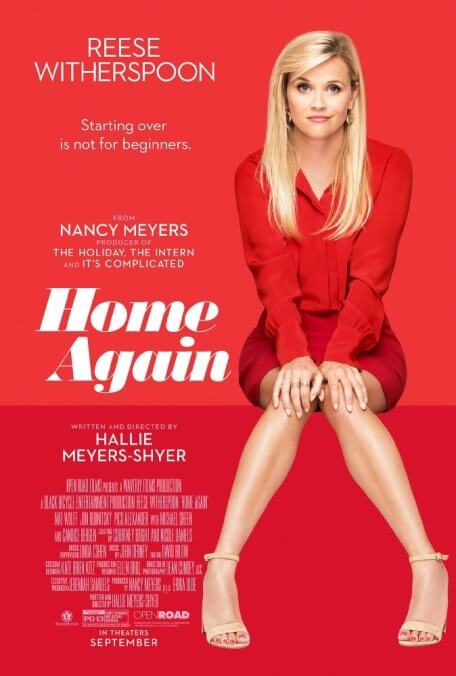You can’t go Home Again (and should probably stay away the first time)

Yes, there’s something to be said for escapism. Not every movie has to engage with the big issues of the day. Sometimes you’re more in the mood for a cinematic soufflé than a dry-rubbed onscreen steak. All that being said, however, if your idea of conflict is that three young filmmakers’ agents are getting them too much work, then your story might just be a teensy bit difficult to relate to.
All that is to say that the new Reese Witherspoon rom-com Home Again is built on presumptions of such staggering privilege and naiveté, it ends up coming by much of its comedy accidentally. (“There will be another guy,” one character says to another, after blowing a meeting with a financier for a debut feature from three unknowns.) Who among us has not dealt with the acute embarrassment of people fawning over your auteur director father and movie-star mother? Or the existential angst of not being taken seriously as an interior decorator simply because you have no experience beyond being a wealthy white woman with an affinity for throw pillows? Perhaps it’s the universal experience of staying for free in a series of well-appointed Hollywood homes. Does it really need to be mentioned that there are very few people of color in this movie, and one of them is an Indian stereotype?
Supposedly, the film’s main, and most credulity-stretching, conceit really happened to an acquaintance of writer/director Hallie Meyers-Shyer. If that’s the case, there is still innocence in this world, and it lives north of Sunset. To wit: Alice (Witherspoon), a mother of two who’s moved back into the family manse in L.A. after separating from her music-industry husband Austen (Michael Sheen), meets a trio of fresh-faced, clean-cut young filmmakers while out celebrating her 40th birthday with some gal pals. She takes the most confident of them home, but the two fail to consummate their passion after Alice’s young suitor gets sick from too much tequila.
This tweaks Alice’s maternal instincts, and so she decides to let Teddy (Nat Wolff), Harry (Pico Alexander), and George (Jon Rudnitsky), whom she just met the day before, stay in her guest house for as long as they want. To be fair, the closest we get to menace from this bizarro Bible-study equivalent to the gang from It’s Always Sunny In Philadelphia is a baggie of weed that falls from one of their pockets at one point. Still, letting a total stranger drive your daughter to her guitar lesson in your dad’s vintage muscle car is a level of trust that went out of style with hitchhiking. In this universe, though, everything works out fine, and the “guys” quickly bond with Alice’s predictably precocious, Zoloft commercial-quoting daughters Isabel (Lola Flanery) and Rosie (Eden Grace Redfield) while she’s out trying to impress her first and only design client, snotty socialite Zoey (Lake Bell).
How quickly, it’s not clear. There’s little to no sense of how much time passes between the time when the “guys” move in to Alice’s place, when Alice and Teddy start sleeping together for real, and when Austen returns, begging for his wife to take him back. If it’s a short time, that’s weird. If it’s a long time, that’s weird, too. The movie is oblivious to this, concentrating instead on Alice’s “you go, girl” emotional journey toward being complete without a man, monologues awkwardly barfed out at ostensibly clever speeds, mortifyingly overwrought reaction shots, and comments on the impressive thread count of Alice’s sheets. It’s like a vintage screwball comedy crossed with a Crate & Barrel catalog, shot in the product-focused manner of the latter.
That last part shouldn’t come as too much of a surprise: Meyers-Shyer is the daughter of Nancy Meyers, who’s listed as a producer on the project and who no doubt helped get it made. (Her father, filmmaker Charles Shyer, served as second unit director.) A certain filmmaking—and interior design—sensibility has clearly been passed down from mother to daughter, down to the shots of everyone gathered around the table for a family dinner at the end. Mumford & Sons-lite banjo muzak dominates the soundtrack.
The younger Meyers has a lot to learn about creating believable character motivations and relationships to anchor the aspirational fantasy. Even at a micro level, the script is full of bizarre, stilted phrasing (this may be the only time you’ll hear the phrase “bullshit artist!” outside of The Greasy Strangler) and out-of-touch stereotypes (if these up-and-comers are smart, they’ll let go of the idea that working with a “horror producer” is beneath them), all of which serve to heighten the essential falsehood of it all. Being born with a silver spoon in your mouth is no excuse for having a tin ear as well.